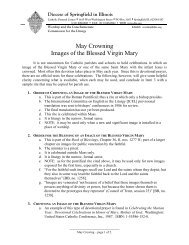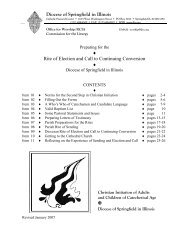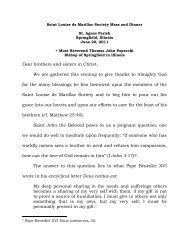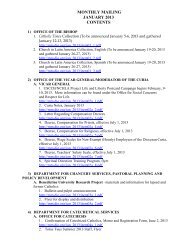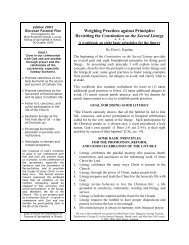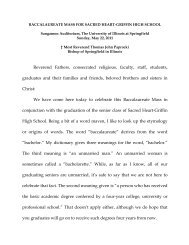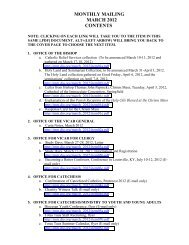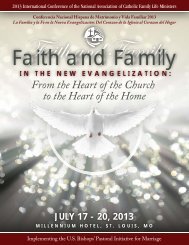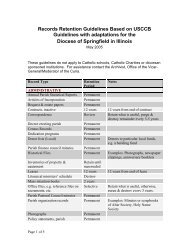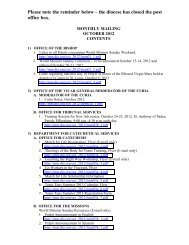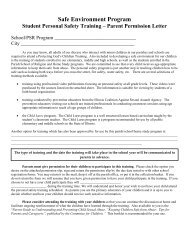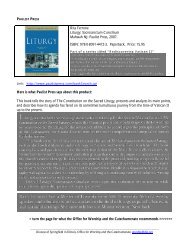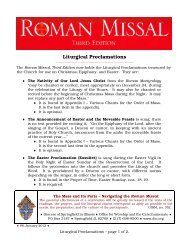Day 6 June 26, 2013Reflections for theFORTNIGHT FOR FREEDOMThese reflections and read<strong>in</strong>gs from the Vatican II document Declaration on Religious Liberty (Dignitatis Humanae) are <strong>in</strong>tendedfor daily use dur<strong>in</strong>g the <strong><strong>For</strong>tnight</strong> for <strong>Freedom</strong>, a national campaign designated by the U.S. Catholic bishops for teach<strong>in</strong>g and witness<strong>in</strong> support <strong>of</strong> religious liberty. The read<strong>in</strong>gs and the questions that follow can be used for group discussion or for personal reflection.The freedom or immunity from coercion <strong>in</strong>matters religious which is the endowment <strong>of</strong> personsas <strong>in</strong>dividuals is also to be recognized as their rightwhen they act <strong>in</strong> community. Religious bodies are arequirement <strong>of</strong> the social nature both <strong>of</strong> man and <strong>of</strong>religion itself.Provided the just requirements <strong>of</strong> public order areobserved, religious bodies rightfully claim freedom <strong>in</strong>order that they may govern themselves accord<strong>in</strong>g totheir own norms, honor the Supreme Be<strong>in</strong>g <strong>in</strong> publicworship, assist their members <strong>in</strong> the practice <strong>of</strong> thereligious life, strengthen them by <strong>in</strong>struction, and promote<strong>in</strong>stitutions <strong>in</strong> which they may jo<strong>in</strong> together for thepurpose <strong>of</strong> order<strong>in</strong>g their lives <strong>in</strong> accordance with theirreligious pr<strong>in</strong>ciples.Religious bodies also have the right not to beh<strong>in</strong>dered, either by legal measures or by adm<strong>in</strong>istrativeaction on the part <strong>of</strong> government, <strong>in</strong> the selection,tra<strong>in</strong><strong>in</strong>g, appo<strong>in</strong>tment, and transferral <strong>of</strong> their own m<strong>in</strong>isters,<strong>in</strong> communicat<strong>in</strong>g with religious authorities andcommunities abroad, <strong>in</strong> erect<strong>in</strong>g build<strong>in</strong>gs for religiouspurposes, and <strong>in</strong> the acquisition and use <strong>of</strong> suitablefunds or properties.believe. They must be free to gather for worship, to<strong>in</strong>struct their members, and to develop <strong>in</strong>stitutionsthat further the religious life <strong>of</strong> their members. Fromwith<strong>in</strong> the Catholic tradition this would <strong>in</strong>clude religious<strong>in</strong>stitutes and orders, schools, fraternities andsodalities, prayer groups, and Bible study groups.Likewise, religious bodies must be free to appo<strong>in</strong>tand tra<strong>in</strong> their own m<strong>in</strong>isters. <strong>For</strong> Catholics, thatmeans the Church’s freedom at least to appo<strong>in</strong>tbishops and orda<strong>in</strong> priests. It also means that Catholicsare free to be loyal to their church and its leaderswhile also be<strong>in</strong>g loyal to their country and its leaders.Religious bodies should also be free to govern themselvesf<strong>in</strong>ancially.Consider examples <strong>in</strong> contemporary life wheregovernments—federal, state, or local—fail to respectthe above rights? What is the relationship betweenthe religious freedom <strong>of</strong> <strong>in</strong>dividuals and <strong>in</strong>stitutions?Declaration on Religious Liberty(Dignitatis Humanae), no. 4December 7, 1965Reflection for Day SixThe Council once more addresses the public nature <strong>of</strong>religious belief. Religious communities have a right toact as a community <strong>of</strong> faith, for this is <strong>in</strong>herent with<strong>in</strong>the social nature <strong>of</strong> human be<strong>in</strong>gs and religious beliefitself. Provided that the just civil and religious rights<strong>of</strong> others are not transgressed, religious bodies mustpossess the freedom to live out publicly what theyExcerpts from The Documents <strong>of</strong> Vatican II, Walter M. Abbott,SJ, General Editor, copyright © 1966 by America Press, Inc.Repr<strong>in</strong>ted with permission. All rights reserved. Copyright ©2012, United States Conference <strong>of</strong> Catholic Bishops, Wash<strong>in</strong>gton,DC. All rights reserved.
Day 7 June 27, 2013Reflections for theFORTNIGHT FOR FREEDOMThese reflections and read<strong>in</strong>gs from the Vatican II document Declaration on Religious Liberty (Dignitatis Humanae) are <strong>in</strong>tendedfor daily use dur<strong>in</strong>g the <strong><strong>For</strong>tnight</strong> for <strong>Freedom</strong>, a national campaign designated by the U.S. Catholic bishops for teach<strong>in</strong>g and witness<strong>in</strong> support <strong>of</strong> religious liberty. The read<strong>in</strong>gs and the questions that follow can be used for group discussion or for personal reflection.Religious bodies also have the right notto be h<strong>in</strong>dered <strong>in</strong> their public teach<strong>in</strong>g and witnessto their faith, whether by the spoken or by the writtenword. However, <strong>in</strong> spread<strong>in</strong>g religious faith and <strong>in</strong><strong>in</strong>troduc<strong>in</strong>g religious practices, everyone ought at alltimes to refra<strong>in</strong> from any manner <strong>of</strong> action which mightseem to carry a h<strong>in</strong>t <strong>of</strong> coercion or <strong>of</strong> a k<strong>in</strong>d <strong>of</strong> persuasionthat would be dishonorable or unworthy, especiallywhen deal<strong>in</strong>g with poor or uneducated people.Such a manner <strong>of</strong> action would have to be consideredan abuse <strong>of</strong> one’s own right and a violation <strong>of</strong> therights <strong>of</strong> others.In addition, it comes with<strong>in</strong> the mean<strong>in</strong>g <strong>of</strong> religiousfreedom that religious bodies should not beprohibited from freely undertak<strong>in</strong>g to show the specialvalue <strong>of</strong> their doctr<strong>in</strong>e <strong>in</strong> what concerns the organization<strong>of</strong> society and the <strong>in</strong>spiration <strong>of</strong> the whole <strong>of</strong>human activity. F<strong>in</strong>ally, the social nature <strong>of</strong> man andthe very nature <strong>of</strong> religion afford the foundation <strong>of</strong> theright <strong>of</strong> men freely to hold meet<strong>in</strong>gs and to establisheducational, cultural, charitable, and social organizations,under the impulse <strong>of</strong> their own religious sense.and freedom must be ma<strong>in</strong>ta<strong>in</strong>ed. The accept<strong>in</strong>g <strong>of</strong>religious beliefs must be an act <strong>of</strong> freedom, otherwiseit is done not because it is believed to be true butrather out <strong>of</strong> fear and force. The right to pr<strong>of</strong>ess andproclaim one’s own faith cannot violate the sameright <strong>of</strong> another.That be<strong>in</strong>g said, religious bodies should be free toprovide reasons as to why their beliefs are true andwhy it would be <strong>of</strong> value for others to believe whatthey believe. They should also be free to address howtheir beliefs contribute to the good <strong>of</strong> society.What contemporary examples are there <strong>of</strong> religiousbodies us<strong>in</strong>g coercion <strong>in</strong> an attempt to spreadtheir faith or h<strong>in</strong>der<strong>in</strong>g others from exercis<strong>in</strong>g theirfaith? What contributions does the Catholic Churchmake to society and culture?Declaration on Religious Liberty(Dignitatis Humanae), no. 4December 7, 1965Reflection for Day SevenWhile the Council Fathers <strong>in</strong>sist that religious bodiesmust be free to teach and bear witness to their faith,they equally stress that this freedom must never beabused. It is not only governments that can deny theirfreedom; <strong>in</strong> attempt<strong>in</strong>g to spread their own beliefs,religions should not force others, physically or psychologically,to convert. Rather, each person’s dignityExcerpts from The Documents <strong>of</strong> Vatican II, Walter M. Abbott,SJ, General Editor, copyright © 1966 by America Press, Inc.Repr<strong>in</strong>ted with permission. All rights reserved. Copyright ©2012, United States Conference <strong>of</strong> Catholic Bishops, Wash<strong>in</strong>gton,DC. All rights reserved.
- Page 8 and 9: the word of the angel, his punishme
- Page 10 and 11: Monday, July 1, 2013Monday, 13th We
- Page 22 and 23: Litany for LibertyFor use during th
- Page 24 and 25: Letanía por la LibertadPara uso du
- Page 26 and 27: Religious FreedomEcumenical Prayer
- Page 28 and 29: I mean that as long as the heir is
- Page 30 and 31: them, “Amen, amen, I say to you,
- Page 32 and 33: Day 2 June 22, 2013Reflections for
- Page 34 and 35: Day 4 June 24, 2013Reflections for
- Page 38 and 39: Day 8 June 28, 2013Reflections for
- Page 40 and 41: Day 10 June 30, 2013Reflections fo
- Page 42 and 43: Day 12 July 2, 2013Reflections for
- Page 44 and 45: Day 14 July 4, 2013Reflections for
- Page 46 and 47: natural death, the unique meaning o
- Page 48 and 49: in whom we find true freedom and la
- Page 50 and 51: So shall I have an answer for those
- Page 52 and 53: desires. If we live in the Spirit,
- Page 54 and 55: For marriage:For all married couple
- Page 56 and 57: What do we mean by religious libert
- Page 59 and 60: The FortnightContinuesAmid growing
- Page 61 and 62: MARRIAGE ANDRELIGIOUS FREEDOMUSCCB
- Page 63 and 64: DISCRIMINATION AGAINST CHRISTIANSTU
- Page 65 and 66: PROVIDING PASTORAL CARETO IMMIGRANT
- Page 67 and 68: RELIGIOUS LIBERTYATTACKED IN INDONE
- Page 69 and 70: RELIGIOUS FREEDOMATTACKED IN NIGERI



